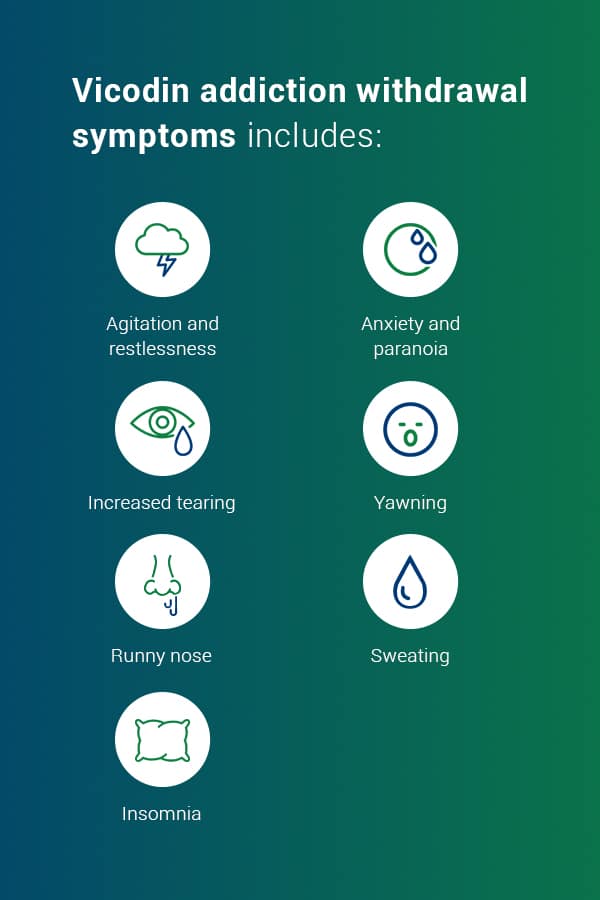Addiction to prescription drugs is a serious issue that should not be taken lightly. Vicodin, a commonly prescribed opioid analgesic, is no exception. While Vicodin can provide relief from pain and discomfort, it can also be dangerously addictive if abused. In this article, we will explore the addictive potential of Vicodin and the risks associated with its misuse. We will discuss the signs of addiction, the effects of long-term abuse, and methods for seeking help.
Vicodin is a highly addictive opioid painkiller. It is important to take Vicodin only as directed by your doctor and not to exceed the prescribed dose. Taking too much Vicodin can lead to physical and psychological dependence. Symptoms of Vicodin addiction include cravings, inability to control usage, and continued use despite negative consequences. If you believe you may be addicted to Vicodin, seek help from a doctor or addiction specialist.

Contents
What Is Vicodin?
Vicodin is a prescription opioid pain medication made up of hydrocodone and acetaminophen. Hydrocodone is a narcotic analgesic, and acetaminophen is a milder painkiller. Vicodin is typically prescribed for short-term relief of moderate to severe pain, usually following surgery or injury.
How Vicodin Works?
Vicodin works by binding to opioid receptors in the brain and altering the perception of pain. It also helps to reduce anxiety and produce a sense of relaxation and euphoria. When taken as prescribed by a doctor, Vicodin can be an effective pain reliever.
The Risk of Vicodin Addiction
Unfortunately, Vicodin can be highly addictive. Like other opioids, Vicodin can be abused, which can lead to dependence and addiction. When someone becomes addicted to Vicodin, they may find themselves taking higher doses more frequently to achieve the same effects. This can lead to tolerance and a need for more of the drug to experience the same level of pain relief.
Signs of Vicodin Addiction
Common signs of Vicodin addiction include feeling a need to take the drug more often or in higher doses than prescribed, taking the drug for non-medical reasons, and feeling withdrawal symptoms when not taking the drug. Other signs include lying about Vicodin use, mood swings, poor performance at work or school, and feeling unable to stop taking the drug.
Treating Vicodin Addiction
Fortunately, there are effective treatments for Vicodin addiction. Treatment typically begins with a medically supervised detox, followed by counseling and behavioral therapies. Medications may also be prescribed to help reduce cravings and withdrawal symptoms. It is important to seek professional help to ensure a safe and successful recovery.
Short- and Long-Term Effects of Vicodin Abuse
Short-term effects of Vicodin abuse include drowsiness, slowed breathing and heart rate, confusion, impaired judgment, and nausea. Long-term effects can include liver damage, kidney failure, depression, respiratory distress, and death.
Physical Effects of Vicodin Abuse
Chronic Vicodin use can cause physical damage to organs, including the brain, liver, kidneys, and lungs. It can also lead to respiratory depression, which can be life-threatening. Additionally, Vicodin abuse can cause physical dependence and addiction.
Psychological Effects of Vicodin Abuse
Vicodin abuse can also have psychological effects, including depression, anxiety, and paranoia. It can also cause impaired judgment, which can lead to risky behavior. Additionally, long-term Vicodin abuse can lead to cognitive impairment, memory problems, and personality changes.
Conclusion
Vicodin is an opioid pain medication that can be effective when taken as prescribed, but it can also be highly addictive. Long-term Vicodin abuse can cause physical and psychological damage, as well as dependence and addiction. Treatment is available and can help those struggling with Vicodin addiction to safely and successfully recover.
Top 6 Frequently Asked Questions
What is Vicodin?
Vicodin is a prescription medication used to treat moderate to severe pain. It is a combination of the opioid hydrocodone and acetaminophen, and is available in both tablet and liquid forms. Vicodin is classified as a Schedule II controlled substance, meaning that it has a high potential for abuse and addiction.
What are the Side Effects of Vicodin?
Common side effects of Vicodin include lightheadedness, nausea, constipation, dizziness, drowsiness, and changes in appetite. It can also cause confusion, mood changes, and hallucinations. Other serious side effects may include slowed breathing, fainting, and slowed heart rate.
How Addictive is Vicodin?
Vicodin is highly addictive, both physically and psychologically. Its combination of hydrocodone and acetaminophen makes it particularly addictive, as it is a powerful opioid painkiller with a high potential for abuse. It can lead to physical dependence and tolerance, which can cause users to take higher doses of Vicodin in order to get the same effect.
What are the Signs of Vicodin Addiction?
Signs of Vicodin addiction include taking higher doses than prescribed, taking Vicodin for longer periods of time than prescribed, difficulty reducing or stopping use, changes in behavior and social circles, spending more time and money obtaining Vicodin, and engaging in risky behaviors.
What are the Risks of Vicodin Addiction?
The risks of Vicodin addiction include physical, psychological, and social harm. Physical risks include slowed breathing, liver damage, and increased risk of overdose. Psychological risks include depression, anxiety, and mood swings. Social risks include relationship problems, financial difficulties, and difficulty performing everyday tasks.
How is Vicodin Addiction Treated?
Vicodin addiction is treated with a combination of medications, therapy, and support groups. Medications such as buprenorphine and naltrexone can help reduce cravings and withdrawal symptoms. Therapy can help the individual learn new coping strategies, address underlying issues, and develop healthier ways of managing pain. Support groups such as Narcotics Anonymous can provide additional support and accountability.
This Is What Happens to Your Brain on Opioids | Short Film Showcase
When it comes to Vicodin, it’s clear that it can be incredibly addictive. The drug has a high potential for abuse, and users should be aware of the risks associated with taking it. Fortunately, there are treatments available for those struggling with an addiction to Vicodin. With proper medical and psychological care, individuals can learn to manage their addiction and lead healthier lives.
